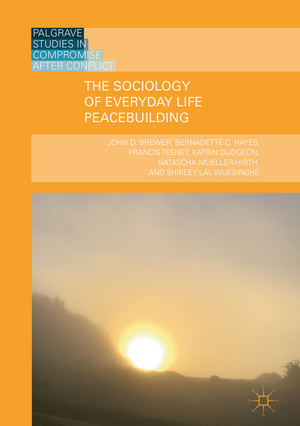The Sociology of Everyday Life Peacebuilding: Palgrave Studies in Compromise after Conflict
Autor John D. Brewer, Bernadette C. Hayes, Francis Teeney, Katrin Dudgeon, Natascha Mueller-Hirth, Shirley Lal Wijesingheen Limba Engleză Hardback – 16 iul 2018
| Toate formatele și edițiile | Preț | Express |
|---|---|---|
| Paperback (1) | 582.63 lei 6-8 săpt. | |
| Springer International Publishing – 15 ian 2019 | 582.63 lei 6-8 săpt. | |
| Hardback (1) | 730.65 lei 6-8 săpt. | |
| Springer International Publishing – 16 iul 2018 | 730.65 lei 6-8 săpt. |
Din seria Palgrave Studies in Compromise after Conflict
- 18%
 Preț: 727.80 lei
Preț: 727.80 lei -
 Preț: 332.14 lei
Preț: 332.14 lei -
 Preț: 380.63 lei
Preț: 380.63 lei -
 Preț: 387.75 lei
Preț: 387.75 lei - 15%
 Preț: 642.03 lei
Preț: 642.03 lei -
 Preț: 387.20 lei
Preț: 387.20 lei - 15%
 Preț: 640.06 lei
Preț: 640.06 lei - 18%
 Preț: 953.20 lei
Preț: 953.20 lei - 18%
 Preț: 783.50 lei
Preț: 783.50 lei - 18%
 Preț: 730.35 lei
Preț: 730.35 lei - 18%
 Preț: 789.83 lei
Preț: 789.83 lei - 15%
 Preț: 591.79 lei
Preț: 591.79 lei - 15%
 Preț: 527.79 lei
Preț: 527.79 lei - 15%
 Preț: 697.15 lei
Preț: 697.15 lei - 15%
 Preț: 528.13 lei
Preț: 528.13 lei - 15%
 Preț: 582.63 lei
Preț: 582.63 lei - 5%
 Preț: 1286.08 lei
Preț: 1286.08 lei - 15%
 Preț: 636.63 lei
Preț: 636.63 lei - 18%
 Preț: 783.50 lei
Preț: 783.50 lei - 15%
 Preț: 640.06 lei
Preț: 640.06 lei - 18%
 Preț: 725.61 lei
Preț: 725.61 lei -
 Preț: 319.81 lei
Preț: 319.81 lei - 15%
 Preț: 640.06 lei
Preț: 640.06 lei
Preț: 730.65 lei
Preț vechi: 891.04 lei
-18% Nou
Puncte Express: 1096
Preț estimativ în valută:
139.81€ • 149.51$ • 116.57£
139.81€ • 149.51$ • 116.57£
Carte tipărită la comandă
Livrare economică 17 aprilie-01 mai
Preluare comenzi: 021 569.72.76
Specificații
ISBN-13: 9783319789743
ISBN-10: 3319789740
Pagini: 289
Ilustrații: XIX, 299 p. 1 illus.
Dimensiuni: 148 x 210 mm
Greutate: 0.53 kg
Ediția:1st ed. 2018
Editura: Springer International Publishing
Colecția Palgrave Macmillan
Seria Palgrave Studies in Compromise after Conflict
Locul publicării:Cham, Switzerland
ISBN-10: 3319789740
Pagini: 289
Ilustrații: XIX, 299 p. 1 illus.
Dimensiuni: 148 x 210 mm
Greutate: 0.53 kg
Ediția:1st ed. 2018
Editura: Springer International Publishing
Colecția Palgrave Macmillan
Seria Palgrave Studies in Compromise after Conflict
Locul publicării:Cham, Switzerland
Cuprins
Chapter 1. Introduction.- Chapter 2. Centring Victims in Peacebuilding.- Chapter 3. Northern Ireland Voices.- Chapter 4. South African Voices.- Chapter 5. Sri Lankan Voices.- Chapter 6. Everyday Life Peacebuilding. Chapter 7. Conclusion.
Notă biografică
John D. Brewer, Queen’s University Belfast, UK
Bernadette C. Hayes, University of Aberdeen, UK
Francis Teeney, Queen's University Belfast, UK
Katrin Dudgeon, Queen's University Belfast, UK
Natascha Mueller-Hirth, Robert Gordon University, UK.
Shirley Lal Wijesinghe, University of Kelaniya, Sri Lanka.
Textul de pe ultima copertă
This book uses in-depth interview data with victims of conflict in Northern Ireland, South Africa and Sri Lanka to offer a new, sociological conceptualization of everyday life peacebuilding. It argues that sociological ideas about the nature of everyday life complement and supplement the concept of everyday life peacebuilding recently theorized within International Relations Studies (IRS). It claims that IRS misunderstands the nature of everyday life by seeing it only as a particular space where mundane, routine and ordinary peacebuilding activities are accomplished. Sociology sees everyday life also as a mode of reasoning. By exploring victims’ ways of thinking and understanding, this book argues that we can better locate their accomplishment of peacebuilding as an ordinary activity. The book is based on six years of empirical research in three different conflict zones and reports on a wealth of interview data to support its theoretical arguments. This data serves to give voice tovictims who are otherwise neglected and marginalized in peace processes.
Caracteristici
Gives attention to the data on victimhood, offering a new sociological approach to the idea of everyday life peacebuilding Argues that victims should be seen as central to the process of conflict transformation Draws on nearly 200 interviews with first generation victims in Northern Ireland, South Africa and Sri Lanka (2010-15) Contrasts sociology’s approach to everyday life peacebuilding with the literature within International Relations Studies
